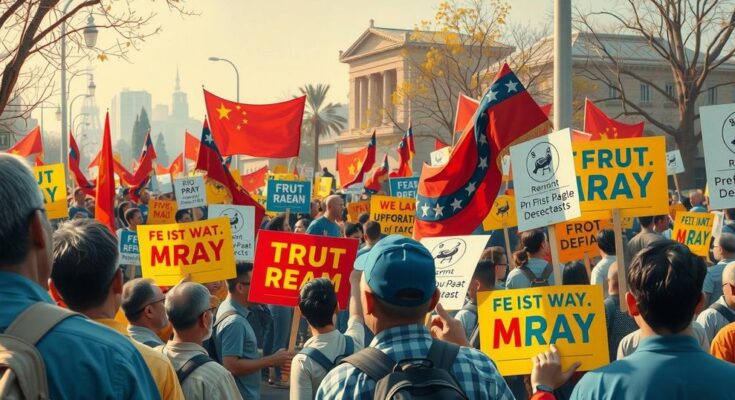Hundreds of activists in Mali staged a historic pro-democracy rally, opposing a bill to dissolve political parties. Demonstrators voiced concerns regarding restrictions on political freedoms under the military government. The rally and subsequent press conference highlighted calls for a return to constitutional governance through inclusive elections, amid fears of escalating political tensions.
BAMAKO, Mali — This past weekend, hundreds of activists gathered in the streets of Bamako for the first pro-democracy rally in years, marking a notable opposition to the military government that has ruled since the series of coups beginning in 2020. As demonstrators took to the streets, they voiced their concerns over a controversial bill aimed at dissolving political parties. This legislation represents yet another attempt by the transitional government to curtail political activity in the West African nation.
The crowd assembled outside the Palais de Culture, a venue that had been previously taken over by pro-military youths, under the watchful eye of police who sought to prevent any confrontations. Chants against dictatorship echoed through the air as the demonstrators expressed their frustration at the military’s tightening grip on power.
The organizers of the rally, in a strong statement, condemned any attempt to limit political parties, labeling it as an assault on the constitution and a disrespect for the Malian people’s sovereignty. Following the rally, civil society leaders, alongside members of political parties and labor organizations, held a press conference calling for a swift return to constitutional order. They demanded the organization of elections that are transparent, inclusive, and peaceful, as emphasized by Cheick Oumar Doumbia, an organizer of the event.
Despite the fervor from the rally, police intervened and dispersed the press conference attendees due to concerns about clashes with military supporters. Experts are wary about the potential escalation of tensions if the transitional government does not ease restrictions on political engagement. Political analyst Mamouni Soumano from Kurukanfuga University highlighted this concern and indicated that much depends on the response of authorities to the mounting dissatisfaction among political factions.
In a separate yet related development, the military government recently enacted a decree to revoke the law that governs political parties, a move that coincided with a national political conference. This conference suggested that Gen. Assimi Goita, who has led the country following the coups, should be appointed president for a five-year term. Abdou Salam Diepkilé, who oversees territorial administration, revealed this proposal, raising concerns about the future of governance.
Moreover, Mali’s leadership has taken significant steps, severing ties and military collaboration with its traditional Western allies, instead turning towards partnerships with Russia, further complicating the political landscape. The demonstrators’ voices, rising against such authoritarian measures, signal a yearning for change, but whether this momentum will continue remains to be seen.
The recent pro-democracy rally in Mali has underscored significant public dissatisfaction with the military government’s attempts to stifle political freedoms. Activists are making their voices heard, but the government’s response remains critical to avoiding further tensions. With proposals favoring military leadership and a shift in international alliances, Mali’s path is fraught with challenges as citizens continue to push for democratic principles and constitutional rights.
Original Source: www.newsday.com




